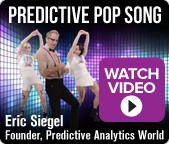Conference Day 1: Tuesday, June 21, 2016 |
8:00-8:45am • Room: Salon A Prefunction
Registration & Networking Breakfast
Conference Welcome Remarks
 Adam Kahn
Adam KahnCOO
Rising Media, Inc.
9:00am -9:50am • Room: Salon A5
Keynote
Weird Science: How to Know Your Predictive Discovery Is Not BS
"An orange used car is least likely to be a lemon." At least that's what was claimed by The Seattle Times, The Huffington Post, The New York Times, NPR, and The Wall Street Journal. However, this discovery has since been debunked as inconclusive. As data gets bigger, so does a common pitfall in the application of standard stats: Testing many predictors means taking many small risks of being fooled by randomness, adding up to one big risk. John Elder calls this issue vast search. In this keynote, PAW founder Eric Siegel will cover this issue and provide guidance on tapping data's potential without drawing false conclusions.
9:50-10:00am • Room: Salon A5
Lightning Round



10:00-10:30am • Room: Salon A Prefunction
Exhibits & Morning Coffee Break
[ Top of this page ] [ Agenda overview ]
10:30-11:15am • Room: Salon A2
 Track 1: Predictive Salesforce
Track 1: Predictive Salesforce Case Study: Vivint
Data Driven Selling: Enabling a Direct Salesforce with Tools that Re-Enforce Predictive Selling Methods
Without the right data and tools a sales force will struggle to achieve maximum business value, instead relying upon experiential (judgment) and heuristic (static rules) sales methods. Predictive modeling was employed to help a company break the barrier to predictive selling methods with two models. 1) Propensity to buy model (CHAID decision tree) to identify willingness to purchase, and 2) Credit model (logistic regression) to identify ability to purchase. Models were derived utilizing a nationally representative survey sample of ~6,500 individuals from which 115M+ households were scored. Custom heat maps (utilizing R) were then built to help in decision-making.
10:30-11:15am • Room: Salon A5
 Track 2: Online Marketing
Track 2: Online MarketingCase Study: SmarterHQ
The Revolution in Retail Customer Intelligence
In this new era of Big Data, retailers collect data in ever-increasing volume and variety. In the midst of Big Data, a revolution is taking place in how retailers gain insights about customers, whether they interact with the brand online, in stores, or both. This session will describe the transition from reporting to data-driven decisions using predictive analytics. Success requires collecting the right data, creating informative derived attributes, making this data accessible in a timely manner, and building predictive models. Examples, drawn from real-world retailers, will include shopping cart funnel management, shopping cart abandonment, marketing attribution, churn, and purchase propensity.
[ Top of this page ] [ Agenda overview ]
11:20-11:40am • Room: Salon A2
 Track 2: Uplift Modeling
Track 2: Uplift ModelingCase Study: Telenor
Intro to Uplift Modeling - Persuade by the Numbers
Data driven decisions are meant to maximize impact - right? Well, the only way to optimize influence is to predict it. The analytical method to do this is called uplift modeling (aka, persuasion modeling). This is a completely different animal from standard predictive models, which predict customer behavior. Instead, uplift models predict the influence on an individual's behavior gained by choosing one treatment over another.
In this session, PAW founder Eric Siegel provides an introduction to this growing area to prepare newcomers for this PAW event's two other sessions covering uplift modeling (one is tomorrow's keynote).
11:20-12:05pm • Room: Salon A5
 Track 2: Workforce Analytics
Track 2: Workforce AnalyticsSelf-Organizing Job Paths: Markov Chains, Predictive Models and More
Where do employees' career paths flow within an organization? Can predictive intelligence inform and form this emergent order? There are at least three mappings of employee growth in organizations:
- Formal, usually hierarchical maps of expected progression, as planned by HR management
- Emergent, sometimes surprising pathways actually taken, which can be modeled with Markov Chains and Graph Theory, and
- Optimized pathways driven by KPI-focused predictive models, which may suggest novel and useful pathways for employee growth.
This discussion will explore these mapping methods, the interfaces between them, and directions for further innovation.
11:45am-12:05pm • Room: Salon A2
 Track 1: Market Research
Track 1: Market ResearchCase Study: Genentech
Utilizing Advanced Analytics to Generate Insights
We designed a few experiments to explore the methods of utilizing text and predictive analytics models to provide insightful guidance for research purpose. We conducted network analysis to identify influential institutes and potential research population, automate the process of combining internally collected profile/survey data and external data sources from the internet and vendors, and then utilize text mining tools to extract correlation, attribute and sentiment information of words for answering key business questions. The results help improve the efficiency and effectiveness of generating insights, provide precise guideline for the accuracy and completeness of data organization, and propose strategic recommendations.
[ Top of this page ] [ Agenda overview ]
DAA Industry Lunch
12:05-1:45pm • Room: Salon A Prefunction
Lunch in Exhibit Hall
12:30-1:15pm • Room: Salon A Prefunction
Book Signing - Revised and Updated Predictive Analytics: The Power to Predict Who Will Click, Buy, Lie, or Die
Eric Siegel, Founder, Predictive Analytics World
Books are free to PAW Business attendees & speaker
1:50-2:35pm • Room: Salon A5
Keynote
Topic: Uplift Modeling
Persuasion Modeling in Presidential Campaigns and How It Applies to Business
Marketing, political campaigning, and healthcare have one major thing in common: organizations combine millions of individual interactions with social, digital, and traditional advertising in order to move people towards positive actions.
Prior to President Obama's reelection campaign, standard practices for persuading voters—that is, changing their minds—were unscientific and driven by long-standing assumptions and unsupported hunches. These practices mirror outreach efforts by other companies and organizations, who know that a certain percentage of their marketing efforts will inevitably be wasted on people who will not be the most receptive.
Daniel Porter of BlueLabs, who served as the Director of Statistical Modeling for the Obama Campaign, will discuss his experience using the results from a large-scale, randomized, controlled experiment that targeted persuadable voters for the Obama Campaign, i.e. persuasion modeling, aka uplift modeling. Daniel will review the ways these cutting edge statistical modeling techniques can be applied to influencing behavior in realms ranging from health outcomes to customer retention. He will also focus on methodological advances that have been made since 2012, how these techniques lead to more precise insights than ever, and how they can be used to drive broader strategic decisions in addition to narrower tactical choices.
[ Top of this page ] [ Agenda overview ]
2:40-3:00pm • Room: Salon A2
 Track 1: Bayesian Networks; Attribution (Driver Analysis)
Track 1: Bayesian Networks; Attribution (Driver Analysis)Case Study: Merkle
A Better Approach to Driver Analysis
How often have we heard questions like, what makes people loyal? Satisfied? Why brand X over brand Y? Often to answer these kinds of questions, we launch a survey and regress the results to see what we can find out. Recently Merkle commissioned a study to understand the dynamics of the fresh-squeezed orange juice market. Instead of doing the typical regression to understand brand choice, we took a different approach Bayesian Networks. The rich structure not only provided greater insight, but a useful simulation model that can estimate market share impact based on attribute changes.
2:40-3:25pm • Room: Salon A5
 Track 2: Model Deployment
Track 2: Model Deployment Best Practices for Deploying Analytic Models into Operations
In most cases, predictive models must be deployed into operational systems before there is any business value. We use a series of case studies to give an overview of some best practices for deploying analytic models. We first discuss deploying analytics using flat files and databases and some of the pros and cos. We then discuss deploying analytics using vendor neutral standards for analytics, such as the Portable Format for Analytics (PFA) and the Predictive Model Markup Language (PMML). We cover PFA and PMML case studies ranging from models built using R to models built using Hadoop, MapReduce and Spark.
3:05pm-3:25pm • Room: Salon A2
 Track 1: Agile Analytics Project Management
Track 1: Agile Analytics Project ManagementCase Study: Allstate
Agile Methodologies for Data Science Projects
In the world of data science, where actionable insights are needed to make critical business decisions, data science teams are on the hook for delivering findings and data products quickly and efficiently. A good project management practice is needed when developing R&D projects to ensure that data teams are effective. This session will discuss how an agile approach to data science can help teams solve this problem and minimizing the risk of building something that your company cannot utilize or implement.
[ Top of this page ] [ Agenda overview ]
3:25-3:55pm • Room: Salon A Prefunction
Exhibits & Afternoon Break
3:55-4:15pm • Room: Salon A2
 Track 1: Insurance
Track 1: InsuranceCase Study: Zurich North America
Data Science in the Insurance industry -- Is There Still an Arms Race?
Insurance is an extremely data intensive industry with deep analytical talent. Even so, predictive analytics is continuing to change the business and there is an analytics arms race in certain segments. Where is data science playing a key role and what is the new interplay between actuarial science and data science?
3:55-4:15pm • Room: Salon A5
 Track 2: Sales Forecasting
Track 2: Sales ForecastingCase Study: Monsanto
Neurons or Transistors? How Monsanto Is Using Predictive Analytics for Sales Forecasting to to Drive Decisions
The IT Analytics team at Monsanto is utilizing predictive modeling to guide decisions made across the entire value chain. This is driving an evolution from decisions being backed by intuition and experience to being driven by data and patterns. In this work we present the use of predictive modeling techniques from basic regression to ensemble methods for sales forecasting. The models are deployed as an end-to-end application with automated data ingestion and execution in an elastic computing environment. The solution is critical to improved decision making.
4:20-4:40pm • Room: Salon A2
 Track 1: Predictive Analytics in Entertainment
Track 1: Predictive Analytics in EntertainmentCase Study: Lyric Opera of Chicago
The Perfect Ensemble -- Predictive Analytics and the Performing Arts
Predictive analytics has had a tremendous impact on a number of different industries but the stage has been set for its next big act - the performing arts.
Lyric Opera of Chicago has been an early adopter of big data and predictive analytics through its use of new software solutions. In using software solutions and other tools, Lyric has been able to turn single-ticket buyers into subscribers and is currently using data to create a new loyalty program for its new audience.
This case study will examine the impact that data and predictive analytics are having on the performing arts.
4:20-4:40pm • Room: Salon A5
 Track 1: Market Research
Track 1: Market ResearchCase Study: National Consumer Panel
Using Predictive Analytics to Optimize Organizational KPI's: A Panel Market Research Case Study
At National Consumer Panel (NCP), a number of KPI's have been developed to help guide the business successfully. Many organizations with KPI's may find that some of them may actually compete with one another for primacy (e.g., sales goals and inventory limits). At NCP, the ideal set of households participating on our panel would be fully representative of the nation's households while also fully participating in the panel by scanning and submitting all of their purchases. Using predictive analytics can help to ensure that the most optimal set of households is selected and maintained.
[ Top of this page ] [ Agenda overview ]
4:45-5:30pm • Room: Salon A2
 Track 1: B-2-B; Thought Leadership
Track 1: B-2-B; Thought LeadershipCase Study: EMC
The Power of Predictive Analytics to Strengthen B2B Customer Relationships
In the next five years, the #1 impact of big data on organizations will be customer relationships (Accenture study, 2014); this is why customer experience matters now more than ever. While this concept of using big data for customer experience analytics in B2C is forthright, historically, B2B's have struggled to effectively leverage the various customer listening posts to improve their customer's journey and loyalty.
In this session, learn how EM's Total Customer Experience Analytics team integrates traditional survey data with operational data to deliver new business value and unlock new opportunities to drive customer growth.
4:45-5:30pm • Room: Salon A5
 Track 2: Uplift Modeling
Track 2: Uplift ModelingCase Study: A Top 20 US bank
Evaluate A Marketing Campaign's Success Using Uplift Modeling
Traditionally the purchases for customers who were included in the campaign are compared with purchases from customers who were not. Any increased purchases recorded for the first group motivated us to conclude that marketing campaign was a success. Is this real success? In this session we discuss uplift models (aka, net lift models) that attack an important weakness of this traditional approach. They help determine the characteristics of customers who actually require an incentive to act thereby saving efforts and costs to target customers who have already planned to purchase irrespective of the incentive.
5:30-7:00pm • Room: Salon A Prefunction
Networking Reception
[ Top of this page ] [ Agenda overview ]
Conference Day 2: Wednesday, June 22, 2016 |
8:00-9:00am • Room: Salon A Prefunction
Registration & Networking Breakfast
Opening and Welcome
Keynote
Rethinking Analytics in a Service-Oriented World
Delivering business value with analytics requires an arguably unbearable pace: we must keep up with business domain challenges, analytic methods to apply to these challenges, and software implementations of these methods. It is necessary to battle with details about databases, machine learning, and ROI but as practitioners we should frequently step back and ask ourselves, What is our work really in service of? A crude but accurate answer might be "making more money", but this misses the motivations that drive many of us. In this keynote, Josh will walk through examples from the world of interactive entertainment and retail, making the case for organizing analytic teams, and their output, around their service to five major aspects of customer value.
[ Top of this page ] [ Agenda overview ]
10:00-10:45am • Room: Salon A2
 Track 1: Tracking Satisfaction Via Social Media
Track 1: Tracking Satisfaction Via Social Media
Case Studies: Capital One, Chase and Experian
How Well Do You Really Know Your Customer?
Data-driven segmentation can help you acquire new customers, but are you using it to deepen existing relationships? As organizations compete on the basis of customer experience, analyzing the customer lifecycle and ongoing journey becomes key. This case study focuses on how to measure the health of customer relationships utilizing a variety of data sources. Using the Consumer Financial Protection Bureau's complaint database, we track the performance of companies such as Capital One, Chase, and Experian. This session demonstrates how predictive analytics can uncover customer complaints in social media, how to track emerging trends, and how to improve negative customer experiences.
10:00-10:45am • Room: Salon A5
 Track 2: Modern Data Challenges
Track 2: Modern Data Challenges
Demystifying the Confusion of Big Data in Customer Level Predictive Analytics Solutions
Our increasingly digitized world of mobile, telematics, and social media technologies represent new challenges for the predictive analytics practitioner. Solutions need to embrace the information emanating from these technologies. Yet, the overall approach in building predictive analytics solutions has not altered with the advent of these technologies. Specific case studies and examples from the world of automobile insurance, retail, and manufacturing using these technologies reinforce the constancy of this disciplined approach in the development of predictive analytics solutions.
[ Top of this page ] [ Agenda overview ]
10:45-11:15am • Room: Salon A Prefunction
Exhibits & Morning Coffee Break
11:15am-12:00pm • Room: Salon A2
 Track 1: Workforce Analytics
Track 1: Workforce Analytics
Case Study: Paychex
Predicting Employee Churn with Anonymity
In the age of Big Data, ethics is becoming increasingly important when predicting behavior responsibly. This is especially true when using predictive analytics to understand the actions of consumers or employees. Join us in reviewing a case study where we apply predictive modeling to increase employee retention, while protecting employees from the invasive big brother¯ perception.
11:15am-12:00pm • Room: Salon A5
 Track 2: Best Practices
Track 2: Best Practices
Q&A: Ask Dean and Robert Anything (about Best Practices)
Preeminent consultant, author and instructor Dean Abbott, along with Open Data Group's partner Robert Grossman, field questions from an audience of predictive analytics practitioners about their work, best practices, and other tips and pointers.
[ Top of this page ] [ Agenda overview ]
12:00-1:30pm • Room: Salon A Prefunction
Lunch in Exhibit Hall
Doing Space-Age Analytics with Our Hunter-Gatherer Brains
Predictive Analytics is so powerful and so useful – everywhere – we are astonished that its widespread adoption has taken so long. Its modest risk and phenomenal return should lead rational actors to cooperatively pool technical and domain expertise to tweak production processes to the benefit of all. And yet, most early projects fail to be implemented – felled by fear, pride, and ignorance.
But we can anticipate those foes! Recall that success requires solving three serious challenges: 1) Convincing experts that their ways can be improved, 2) Discovering new breakthroughs, and 3) Getting front-line users to completely change the way they work. No wonder there is resistance at every stage!
John argues that it's helpful to have a mental model of the human brain as not optimized for success in our modern life of safety and abundance, but for survival within a small tribal society. And that with this model we can better anticipate – and escape - the traps that we idealistic techno-nerds tend to blunder into as we try to bring life-changing fire into the tribal circle.
[ Top of this page ] [ Agenda overview ]
Expert Panel
Data Prep: Overcoming the Bottleneck and Nailing It
Machine learning reigns supreme - but, alas, you first need examples from which to learn. The vast majority of hands-on time for most predictive analytics initiatives is spent preparing the data. Estimates generally hover around 80%. To realize the great potential of predictive modeling, you must form training data that consists of one row per training example, each consisting of a list of predictor (independent) variables, plus the target (dependent) variable that you plan to model/predict. The data prep is always a specialized task, which can only at best be partially automated and is replete with elusive pitfalls and unexpected delays. This expert panel will address:
- Tricks of the trade for data prep
- Tools, methods, and techniques
- Anecdotal successes and hard lessons learned
Panelists:
3:00-3:30pm • Room: Salon A Prefunction
Exhibits & Afternoon Break
 Track 1: Thought Leadership
Track 1: Thought Leadership
Data Science Mindset for the Rest of Us
Many non data scientists are looking to move from making qualitative gut reactions to quantitative data-driven decisions but don't fully understand the benefits and don't know where to begin. In this talk, we'll explore how human judgement is often systematically flawed, why humans are biologically wired by evolution to make poor gut decisions, and how data science can help us make better decisions. We'll delve into case studies using contemporary events like the 2008 stock market crash or the Vioxx drug approval scandal to understand some common simple mistakes even data scientists make and the limitations of data science.
 Track 1: Market Mix Modeling
Track 1: Market Mix Modeling
Case Study: Charter Communications
Sales Attribution, Lessons from the Non-Digital World
Digital business is not the first to grapple with the sales attribution problem. Before emails and clicks, there were catalogs, phone calls, and mail orders.
The goal of true attribution is to establish the difference that a certain marketing vehicle has made in overall sales. Determining what would have happened if the marketing campaign was not run is the most difficult part. Businesses have long used controlled experiments to determine the incremental impact of marketing communications. The presentation will look at examples of misattribution and give practical tips for calculating incremental sales.
3:30-4:15pm • Room: Salon A5
Track 2: Price Optimization
Case Study: Visible World
Pricing Prediction for Advanced TV Advertising
Television advertising today allows for very specific audiences to be targeted through the use of advanced technologies and data which ties TV viewership to business results. As a result, TV ads can be scheduled so that a greater proportion of viewers are part of the advertiser's intended audience. This significantly changes how TV ads can and should be priced. Advertising inventory holders like Networks and Cable Companies have greater interest in how they can apply advanced analytics to determining the best price for their inventory. This presentation will cover methods for predicting pricing where experimentation capabilities are limited.
[ Top of this page ] [ Agenda overview ]
 Track 1: Aviation and Risk Modeling
Track 1: Aviation and Risk Modeling
Case Study: LEADS AEROSPACE
Optimizing Model-Based Risk Management in the Aviation Industry
The aviation industry is rapidly advancing safety measures, risk management, and overall efficiency by leveraging an onslaught of new data: New "connected aircraft" systems, satellite communications, and ground alternative connectivity solutions. In this presentation, Leads Aerospace CEO Babacar N. Seck will cover how this new strategic trend operates to reduce risk, and will explore an example innovative predictive aviation use case.
4:15-5:00pm • Room: Salon A5
 Track 2: Inventory Management
Track 2: Inventory Management
Case Study: Hewlett Packard
Retail Shrink Prediction to Improve Store Operation Efficiency
Inventory shrink (the loss of products) costs retailers on average 2-5% of topline sales revenue. HPE is working with a leading global retail company on operationalized analytics that support the reduction and management of retail shrink. Our approach aligns multiple, disparate data sources including point of sale transaction logs, product returns, store and surrounding area attributes, store staffing & training, supply chain data and more. Predictive models are developed to identify the top shrink drivers and predict shrink dollar loss for different type of stores. This session will describe how HPE's analytics methodology provides high value to the store managers, helping them manage shrink and increase operational efficiency through predictive model-based recommendations and strategic actions.
[ Top of this page ] [ Agenda overview ]
















 Green dollar-sign sessions denote financial services
Green dollar-sign sessions denote financial services











































